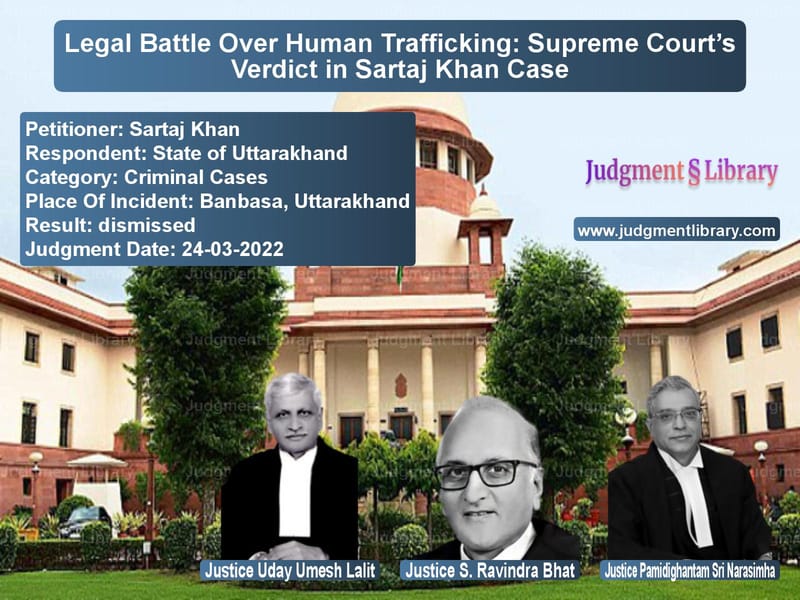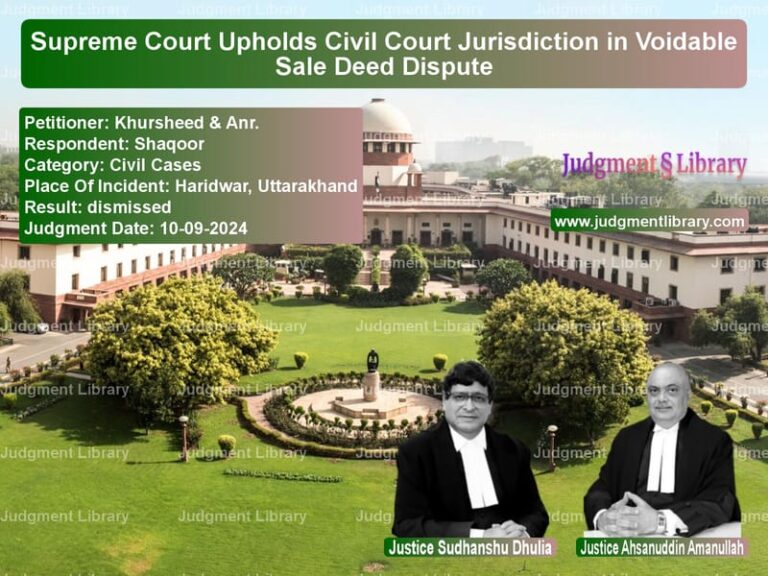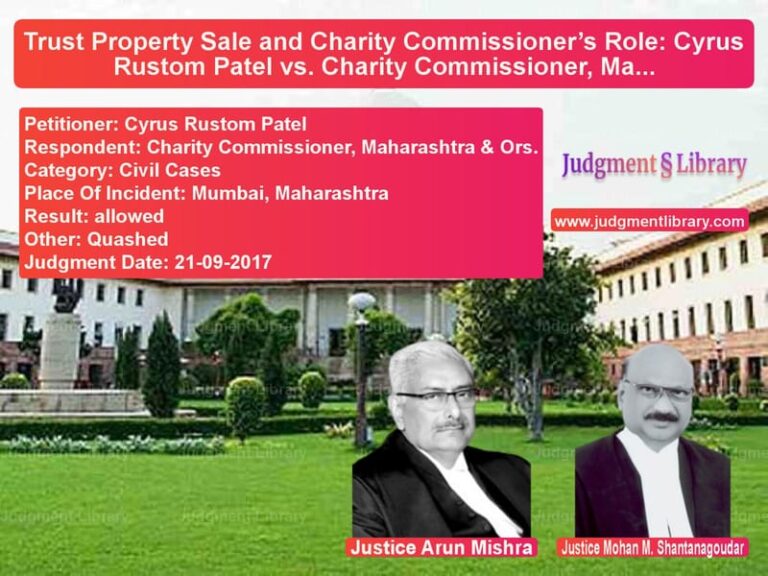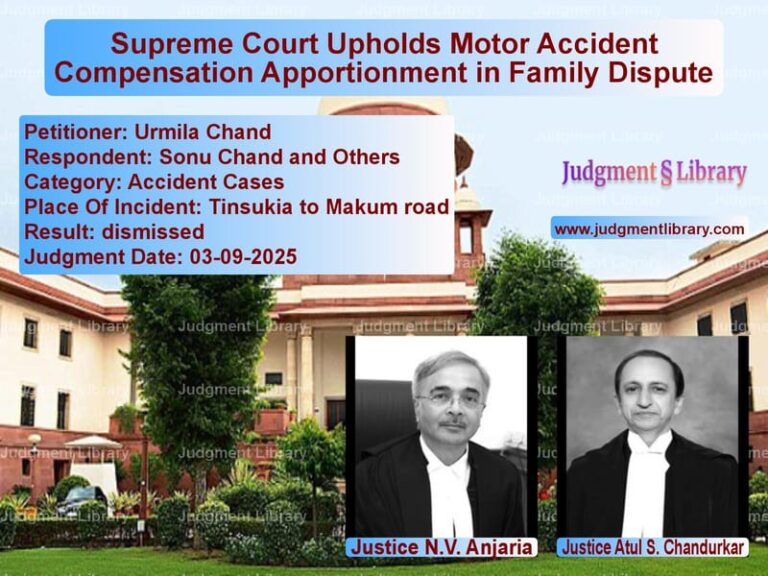Legal Battle Over Human Trafficking: Supreme Court’s Verdict in Sartaj Khan Case
The case of Sartaj Khan v. State of Uttarakhand sheds light on crucial legal aspects surrounding human trafficking, child protection, and cross-border crime jurisdiction. This case, which reached the Supreme Court of India, revolves around the alleged trafficking of a minor girl from Nepal into India, with the intent of exploiting her.
The Supreme Court’s verdict reaffirms India’s stringent stance on human trafficking and the protection of minors under laws such as the Indian Penal Code (IPC) and the Protection of Children from Sexual Offences (POCSO) Act. The Court addressed critical legal arguments regarding the necessity of sanction under Section 188 of the Code of Criminal Procedure (CrPC), the age of the victim, and the admissibility of circumstantial evidence.
Background of the Case
On April 11, 2015, the Human Trafficking Unit in Banbasa, Uttarakhand, was conducting routine checks at the Indo-Nepal border when they received information about a potential trafficking case. A minor girl of Nepalese origin was reportedly being brought into India under suspicious circumstances. The police acted immediately and intercepted a suspect near the border, later identified as Sartaj Khan. The girl, referred to as ‘XXX’ in the case to protect her identity, was found near a snack stall. Upon questioning, she revealed that Khan had lured her with the promise of shopping in India and had inappropriate physical interactions with her during their journey.
The police conducted an immediate search of Khan and found incriminating materials, including a pocket diary, a packet of condoms, a few pills, and some Indian and Nepalese currency. The items were seized, and an FIR was registered against him. Khan was charged under multiple sections of the IPC and the POCSO Act.
Trial and High Court Proceedings
The Trial Court in Uttarakhand heard the case, during which six witnesses were examined by the prosecution. The prosecution primarily relied on the testimony of:
- PW1 Manju Pandey: A police officer involved in the operation.
- PW2 ‘XXX’: The victim, who provided details about how Khan deceived her.
- PW3 Meera Saud: A volunteer who assisted with translation and interrogation.
- PW4 Dr. Vinod Kumar Joshi: A medical examiner who confirmed the victim’s age.
Despite the compelling evidence, the Trial Court acquitted Sartaj Khan, citing a lack of direct evidence proving intent to exploit the victim. The State of Uttarakhand appealed this decision in the High Court.
Read also: https://judgmentlibrary.com/supreme-court-cancels-bail-in-puran-mal-vs-state-of-haryana-murder-case/
The High Court overturned the acquittal, stating that the Trial Court had ignored material evidence. The Court convicted Khan under Sections 363, 366-B, 370(4), and 506 IPC, along with Section 8 of the POCSO Act. He was sentenced to 10 years in prison for trafficking and 3 years for the POCSO offense, with all sentences to run concurrently.
Supreme Court Arguments
Khan challenged the High Court’s decision before the Supreme Court, arguing:
- Violation of Section 188 of the CrPC: His counsel argued that no sanction had been obtained from the Central Government for prosecuting an offense that partly occurred outside India.
- No coercion or allurement: He claimed the victim willingly traveled with him and was not coerced into entering India.
- Victim’s age was over 18: The defense disputed the medical findings regarding the victim’s age.
The State of Uttarakhand rebutted these claims, emphasizing that:
- The offense occurred in India, eliminating the need for Section 188 sanction.
- The victim’s age was confirmed through medical examinations.
- The presence of condoms and pills indicated an intent to exploit the victim.
Supreme Court Judgment
The Supreme Court dismissed Khan’s appeal, affirming the High Court’s ruling. The key observations were:
- Jurisdiction and Section 188: The offense was partially committed in India, making sanction unnecessary.
- Victim’s age: Medical reports consistently showed she was below 18.
- Intent to traffic: The circumstances, coupled with the recovered items, established the intent.
The Court sentenced Khan to a total of 10 years in prison under relevant sections of the IPC and the POCSO Act.
Conclusion
This case underscores the judiciary’s commitment to combating human trafficking and protecting minors from exploitation. It reinforces the need for cross-border legal cooperation and stringent application of trafficking laws. The Supreme Court’s ruling serves as a precedent for similar cases involving the movement of minors across international borders.
Petitioner Name: Sartaj Khan.Respondent Name: State of Uttarakhand.Judgment By: Justice Uday Umesh Lalit, Justice S. Ravindra Bhat, Justice Pamidighantam Sri Narasimha.Place Of Incident: Banbasa, Uttarakhand.Judgment Date: 24-03-2022.
Don’t miss out on the full details! Download the complete judgment in PDF format below and gain valuable insights instantly!
Download Judgment: sartaj-khan-vs-state-of-uttarakhand-supreme-court-of-india-judgment-dated-24-03-2022.pdf
Directly Download Judgment: Directly download this Judgment
See all petitions in Juvenile Justice
See all petitions in Fraud and Forgery
See all petitions in Attempt to Murder Cases
See all petitions in Custodial Deaths and Police Misconduct
See all petitions in SC/ST Act Case
See all petitions in Judgment by Uday Umesh Lalit
See all petitions in Judgment by S Ravindra Bhat
See all petitions in Judgment by P.S. Narasimha
See all petitions in dismissed
See all petitions in supreme court of India judgments March 2022
See all petitions in 2022 judgments
See all posts in Criminal Cases Category
See all allowed petitions in Criminal Cases Category
See all Dismissed petitions in Criminal Cases Category
See all partially allowed petitions in Criminal Cases Category







